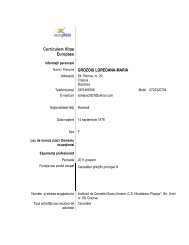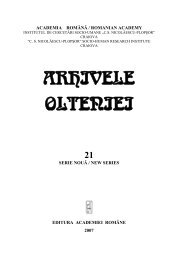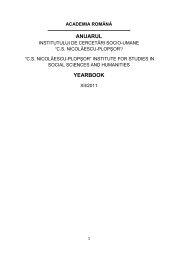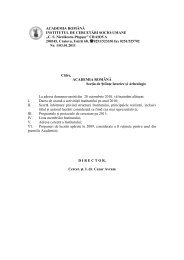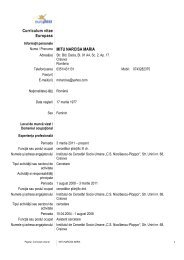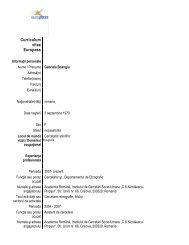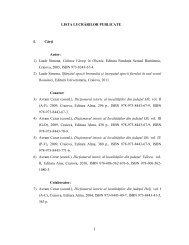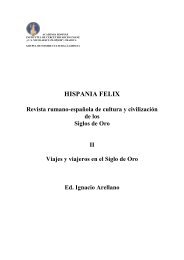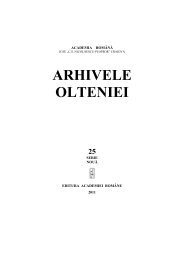- Page 1 and 2: ACADEMIA ROMÂNĂ INSTITUTUL DE CER
- Page 3 and 4: ARHEOLOGIE-ISTORIE CUPRINS SIMONA L
- Page 5: ECONOMIE ION ROŞU HAMZESCU, NĂSTA
- Page 8 and 9: 8 Simona Lazăr ___________________
- Page 10 and 11: 10 Simona Lazăr __________________
- Page 12 and 13: 12 Simona Lazăr __________________
- Page 14 and 15: 14 Simona Lazăr __________________
- Page 16 and 17: 16 Iohana Nichita _________________
- Page 18 and 19: 18 Iohana Nichita _________________
- Page 20 and 21: 20 Iohana Nichita _________________
- Page 22 and 23: 22 Iohana Nichita _________________
- Page 24 and 25: 24 Iohana Nichita _________________
- Page 26 and 27: 26 Iohana Nichita _________________
- Page 28 and 29: 28 Iohana Nichita _________________
- Page 31 and 32: ŞCOALA DIPLOMATICĂ GREACĂ CEZAR
- Page 33 and 34: Şcoala diplomatică greacă 33 ___
- Page 35 and 36: Şcoala diplomatică greacă 35 ___
- Page 37 and 38: Şcoala diplomatică greacă 37 ___
- Page 39 and 40: Şcoala diplomatică greacă 39 ___
- Page 41 and 42: Şcoala diplomatică greacă 41 ___
- Page 43 and 44: Şcoala diplomatică greacă 43 ___
- Page 45 and 46: Şcoala diplomatică greacă 45 ___
- Page 47 and 48: Şcoala diplomatică greacă 47 ___
- Page 49: Şcoala diplomatică greacă 49 ___
- Page 53 and 54: Secolul de aur spaniol între teori
- Page 55 and 56: Secolul de aur spaniol între teori
- Page 57 and 58: Secolul de aur spaniol între teori
- Page 59 and 60: AL DOILEA TEZAUR MONETAR DESCOPERIT
- Page 61 and 62: Al doilea tezaur monetar descoperit
- Page 63 and 64: Al doilea tezaur monetar descoperit
- Page 65 and 66: Al doilea tezaur monetar descoperit
- Page 67 and 68: Al doilea tezaur monetar descoperit
- Page 69 and 70: Al doilea tezaur monetar descoperit
- Page 71 and 72: CONFLICTE ÎNTRE BOIERII GLOGOVENI
- Page 73 and 74: Conflicte între boierii Glogoveni
- Page 75 and 76: Conflicte între boierii Glogoveni
- Page 77 and 78: Conflicte între boierii Glogoveni
- Page 79 and 80: VIAŢA LA CURTEA DOMNEASCĂ ÎN VRE
- Page 81 and 82: Viaţa la Curtea domnească în vre
- Page 83 and 84: Viaţa la Curtea domnească în vre
- Page 85 and 86: Viaţa la Curtea domnească în vre
- Page 87 and 88: Viaţa la Curtea domnească în vre
- Page 89: Viaţa la Curtea domnească în vre
- Page 92 and 93: 92 Nicolae Mihai __________________
- Page 94 and 95: 94 Nicolae Mihai __________________
- Page 96 and 97: 96 Nicolae Mihai __________________
- Page 98 and 99: 98 Nicolae Mihai __________________
- Page 100 and 101:
100 Nicolae Mihai _________________
- Page 102 and 103:
102 Nicolae Mihai _________________
- Page 104 and 105:
104 Nicolae Mihai _________________
- Page 106 and 107:
106 Nicolae Mihai _________________
- Page 108 and 109:
108 Nicolae Mihai _________________
- Page 110 and 111:
110 Nicolae Mihai _________________
- Page 113 and 114:
OPINII ISTORIOGRAFICE PRIVIND EVOLU
- Page 115 and 116:
Opinii istoriografice privind evolu
- Page 117 and 118:
Opinii istoriografice privind evolu
- Page 119 and 120:
Opinii istoriografice privind evolu
- Page 121:
Opinii istoriografice privind evolu
- Page 124 and 125:
124 Diana-Mihaela Păunoiu, Alin Mi
- Page 126 and 127:
126 Diana-Mihaela Păunoiu, Alin Mi
- Page 128 and 129:
128 Diana-Mihaela Păunoiu, Alin Mi
- Page 130 and 131:
130 Diana-Mihaela Păunoiu, Alin Mi
- Page 132 and 133:
132 Diana-Mihaela Păunoiu, Alin Mi
- Page 134 and 135:
134 Diana-Mihaela Păunoiu, Alin Mi
- Page 136 and 137:
136 Diana-Mihaela Păunoiu, Alin Mi
- Page 138 and 139:
138 Diana-Mihaela Păunoiu, Alin Mi
- Page 140 and 141:
140 Diana-Mihaela Păunoiu, Alin Mi
- Page 142 and 143:
142 Florin Gheţău _______________
- Page 144 and 145:
144 Florin Gheţău _______________
- Page 146 and 147:
146 Florin Gheţău _______________
- Page 148 and 149:
148 Florin Gheţău _______________
- Page 151 and 152:
RELAŢII MILITARE ROMÂNO-IUGOSLAVE
- Page 153 and 154:
Relaţii militare româno-iugoslave
- Page 155 and 156:
Relaţii militare româno-iugoslave
- Page 157 and 158:
Relaţii militare româno-iugoslave
- Page 159 and 160:
Relaţii militare româno-iugoslave
- Page 161:
Relaţii militare româno-iugoslave
- Page 164 and 165:
164 Circulaţia monetară în Olten
- Page 166 and 167:
166 Circulaţia monetară în Olten
- Page 168 and 169:
168 Circulaţia monetară în Olten
- Page 170 and 171:
170 Circulaţia monetară în Olten
- Page 172 and 173:
172 Narcisa Maria Mitu ____________
- Page 174 and 175:
174 Narcisa Maria Mitu ____________
- Page 176 and 177:
176 Narcisa Maria Mitu ____________
- Page 178 and 179:
178 Narcisa Maria Mitu ____________
- Page 180 and 181:
180 Narcisa Maria Mitu ____________
- Page 182 and 183:
182 Narcisa Maria Mitu ____________
- Page 184 and 185:
184 Narcisa Maria Mitu ____________
- Page 186 and 187:
186 Narcisa Maria Mitu ____________
- Page 188 and 189:
188 Narcisa Maria Mitu ____________
- Page 190 and 191:
190 Narcisa Maria Mitu ____________
- Page 192 and 193:
192 Narcisa Maria Mitu ____________
- Page 194 and 195:
194 Narcisa Maria Mitu ____________
- Page 196 and 197:
196 Narcisa Maria Mitu ____________
- Page 198 and 199:
198 Gabriel Lohon _________________
- Page 200 and 201:
200 Gabriel Lohon _________________
- Page 202 and 203:
202 Gabriel Lohon _________________
- Page 205 and 206:
NICOLAE CEAUŞESCU ÎI CONSIDERA RO
- Page 207 and 208:
Nicolae Ceauşescu îi considera ro
- Page 209 and 210:
Nicolae Ceauşescu îi considera ro
- Page 211 and 212:
Nicolae Ceauşescu îi considera ro
- Page 213 and 214:
Nicolae Ceauşescu îi considera ro
- Page 215 and 216:
Nicolae Ceauşescu îi considera ro
- Page 217 and 218:
Nicolae Ceauşescu îi considera ro
- Page 219 and 220:
Nicolae Ceauşescu îi considera ro
- Page 221 and 222:
Nicolae Ceauşescu îi considera ro
- Page 223 and 224:
Nicolae Ceauşescu îi considera ro
- Page 225 and 226:
PROGRAMUL DE COOPERARE ÎN DOMENIUL
- Page 227 and 228:
Programul de cooperare în domeniul
- Page 229 and 230:
Programul de cooperare în domeniul
- Page 231 and 232:
Programul de cooperare în domeniul
- Page 233 and 234:
Programul de cooperare în domeniul
- Page 235 and 236:
ELICOPTERE MILITARE FRANŢUZEŞTI,
- Page 237 and 238:
Elicoptere militare franţuzeşti,
- Page 239 and 240:
Elicoptere militare franţuzeşti,
- Page 241 and 242:
Elicoptere militare franţuzeşti,
- Page 243 and 244:
Elicoptere militare franţuzeşti,
- Page 245 and 246:
Elicoptere militare franţuzeşti,
- Page 247 and 248:
Elicoptere militare franţuzeşti,
- Page 249 and 250:
Elicoptere militare franţuzeşti,
- Page 251:
Elicoptere militare franţuzeşti,
- Page 254 and 255:
254 Daniel Marguerat ______________
- Page 256 and 257:
256 Daniel Marguerat ______________
- Page 258 and 259:
258 Daniel Marguerat ______________
- Page 260 and 261:
260 Daniel Marguerat ______________
- Page 262 and 263:
262 Daniel Marguerat ______________
- Page 264 and 265:
264 Daniel Marguerat ______________
- Page 266 and 267:
266 Daniel Marguerat ______________
- Page 268 and 269:
268 Daniel Marguerat ______________
- Page 270 and 271:
270 Daniel Marguerat ______________
- Page 272 and 273:
272 Daniel Marguerat ______________
- Page 274 and 275:
274 Daniel Marguerat ______________
- Page 277 and 278:
PATRIARHULUI MIRON CRISTEA LUCIAN D
- Page 279 and 280:
Patriarhului Miron Cristea 279 ____
- Page 281 and 282:
Patriarhului Miron Cristea 281 ____
- Page 283:
Patriarhului Miron Cristea 283 ____
- Page 286 and 287:
286 Iustina Burci _________________
- Page 288 and 289:
288 Iustina Burci _________________
- Page 290 and 291:
290 Iustina Burci _________________
- Page 292 and 293:
292 Iustina Burci _________________
- Page 294 and 295:
294 Iustina Burci _________________
- Page 296 and 297:
296 Iustina Burci _________________
- Page 298 and 299:
298 Iustina Burci _________________
- Page 300 and 301:
300 Tudor Nedelcea ________________
- Page 302 and 303:
302 Tudor Nedelcea ________________
- Page 304 and 305:
304 Tudor Nedelcea ________________
- Page 306 and 307:
306 Tudor Nedelcea ________________
- Page 308 and 309:
308 Tudor Nedelcea ________________
- Page 310 and 311:
310 Tudor Nedelcea ________________
- Page 312 and 313:
312 Tudor Nedelcea ________________
- Page 315 and 316:
VECHI TIPURI DE LOCUINŢĂ PE TERIT
- Page 317 and 318:
Vechi tipuri de locuinţă pe terit
- Page 319 and 320:
Vechi tipuri de locuinţă pe terit
- Page 321 and 322:
Vechi tipuri de locuinţă pe terit
- Page 323 and 324:
Vechi tipuri de locuinţă pe terit
- Page 325 and 326:
Vechi tipuri de locuinţă pe terit
- Page 327 and 328:
DATINI ŞI CREDINŢE DE BOBOTEAZĂ
- Page 329 and 330:
Datini şi credinţe de Bobotează
- Page 331 and 332:
Datini şi credinţe de Bobotează
- Page 333 and 334:
REECHILIBRAREA DINAMICĂ A SPIRITUL
- Page 335 and 336:
Reechilibrarea dinamică a spiritul
- Page 337 and 338:
Reechilibrarea dinamică a spiritul
- Page 339 and 340:
Reechilibrarea dinamică a spiritul
- Page 341 and 342:
ARHIVELE OLTENIEI, Serie nouă, nr.
- Page 343 and 344:
Erosul european în secolul al XIX-
- Page 345 and 346:
Erosul european în secolul al XIX-
- Page 347 and 348:
Erosul european în secolul al XIX-
- Page 349 and 350:
Erosul european în secolul al XIX-
- Page 351 and 352:
Erosul european în secolul al XIX-
- Page 353 and 354:
Erosul european în secolul al XIX-
- Page 355 and 356:
Erosul european în secolul al XIX-
- Page 357 and 358:
QUINE ŞI RELATIVITATEA ONTOLOGICĂ
- Page 359 and 360:
Quine şi relativitatea ontologică
- Page 361 and 362:
Quine şi relativitatea ontologică
- Page 363:
Quine şi relativitatea ontologică
- Page 366 and 367:
366 Trandafir Cristinel ___________
- Page 368 and 369:
368 Trandafir Cristinel ___________
- Page 370 and 371:
370 Trandafir Cristinel ___________
- Page 372 and 373:
372 Trandafir Cristinel ___________
- Page 374 and 375:
374 Trandafir Cristinel ___________
- Page 376 and 377:
376 Trandafir Cristinel ___________
- Page 379 and 380:
ARHIVELE OLTENIEI, Serie nouă, nr.
- Page 381 and 382:
Combaterea discriminării etnice: a
- Page 383 and 384:
Combaterea discriminării etnice: a
- Page 385 and 386:
Combaterea discriminării etnice: a
- Page 387 and 388:
Combaterea discriminării etnice: a
- Page 389 and 390:
Combaterea discriminării etnice: a
- Page 391 and 392:
Combaterea discriminării etnice: a
- Page 393 and 394:
Combaterea discriminării etnice: a
- Page 395 and 396:
Combaterea discriminării etnice: a
- Page 397 and 398:
Combaterea discriminării etnice: a
- Page 399 and 400:
REGIMUL JURIDIC AL CONTRACTULUI DE
- Page 401 and 402:
Regimul juridic al contractului de
- Page 403 and 404:
Regimul juridic al contractului de
- Page 405 and 406:
Regimul juridic al contractului de
- Page 407 and 408:
EFICIENŢA ACTIVITĂŢII FIRMELOR G
- Page 409 and 410:
Eficienţa activităţii firmelor g
- Page 411 and 412:
Eficienţa activităţii firmelor g
- Page 413 and 414:
Eficienţa activităţii firmelor g
- Page 415 and 416:
Eficienţa activităţii firmelor g
- Page 417 and 418:
Eficienţa activităţii firmelor g
- Page 419 and 420:
RECLAMA COMERCIALĂ ŞI ROLUL SĂU
- Page 421 and 422:
Reclama comercială şi rolul său
- Page 423 and 424:
Reclama comercială şi rolul său
- Page 425 and 426:
Reclama comercială şi rolul său
- Page 427 and 428:
Reclama comercială şi rolul său
- Page 429 and 430:
Reclama comercială şi rolul său
- Page 431 and 432:
GHEORGHE CHIŢU - BIOGRAFIE RECTIFI
- Page 433 and 434:
Gheorghe Chiţu - biografie rectifi
- Page 435:
Gheorghe Chiţu - biografie rectifi
- Page 438 and 439:
438 Mihaela Damean ________________
- Page 441 and 442:
ARHIVELE OLTENIEI, Serie nouă, nr.
- Page 443 and 444:
Recenzii 443 ______________________
- Page 445 and 446:
Recenzii 445 ______________________
- Page 447 and 448:
Recenzii 447 ______________________
- Page 449 and 450:
Recenzii 449 ______________________
- Page 451 and 452:
Recenzii 451 ______________________
- Page 453 and 454:
ABREVIERI AO Arhivele Olteniei AO s
- Page 455:
Acest număr al revistei „Arhivel



